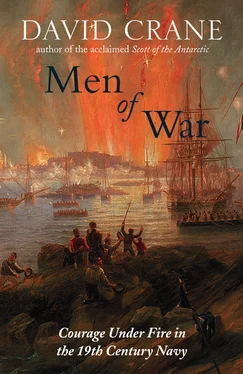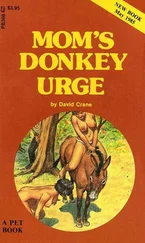The fighting instincts were no less rampant – ‘After all,’ Thomas Hughes cheerfully asked in Tom Brown’s Schooldays , ‘what would life be without fighting, I should like to know?’ – but no one who had had their first scrap at the back of Thomas Arnold’s chapel at Rugby was ever left in any doubt of the need for a just moral cause. ‘From the cradle to the grave,’ Hughes went on, neatly subsuming the soul, the school playground and the killing grounds of the Alma and Inkerman into one moral universe, ‘fighting, rightly understood, is the business, the real, highest, honestest business of every son of man. Every one who is worth his salt has his enemies, who must be beaten, be they evil thoughts and habits in himself, or spiritual wickedness in high places, or Russians, or Border-ruffians, or Bill, Tom, or Harry, who will not let him live his life in quiet till he has thrashed them.’
The pages of Tom Brown’s Schooldays are as good a place as any to feel the moral change that had overtaken nineteenth-century Britain, and one of the fascinations of the three lives here is the ways in which natural warriors of successive generations justified to themselves Hastings’s ‘art of killing’. As a boy of seventeen William Peel would experience all the thoughtless excitement of action at the bombardment of Acre; but if that takes little understanding, what was it that enabled a man of his intelligence, piety, innate gentleness and background to fight with such brilliance in the Crimea in defence of an Ottoman Empire that was repugnant to every tenet he held?
Perhaps the first and most prosaic answer is that there was a burgeoning belief in the nineteenth century – and one to which Peel ardently subscribed – that God’s Higher Purpose was to be worked out through British civilisation, British arms and British trade. Seldom can the long, disreputable history of the ‘Just War’ have been deflected to such improbable purposes. ‘There cannot be a doubt that it is a just war we are engaged in,’ wrote Captain Hedley Vicars, a natural warrior and Popery-hating zealot who in 1854 looked forward to Britain’s triumph over the Russians in the Crimea as a portent of the imminent ‘coming of the Son of Man’.
There are some people, I know, who cannot imagine how any Christian could ever join the deadly strife of battle; but I can only say with such I do not agree, so I shall not flinch from doing my duty to my Queen and Country, the Lord being my helper … I consider war to be … as much a visitation from the Almighty as cholera or any other scourge; and as on the appearance of that dreadful malady, we do not sit quietly down and let it take its course, but very rightly (trusting in the blessing of God) use every precaution, and employ every means to drive it from amongst us, so in the case of this war with the Russian despot. He has made an aggression against a country (one of our oldest allies), which has given him no just cause of provocation, and has thus disturbed the peace of Europe and let loose upon us the horrors of war, and shall we Britons let him have his way, and tamely look on? God forbid! Rather will we, the Lord being our ‘shield and buckler’ crush the evil, and restore peace and quietness to the land.
There were other, and contradictory, strands at work too, and alongside this growing belief in Britain’s Divine Mission was a lurking anxiety that the sinews of national life had been fatally softened by long years of peace. The triumphant success of the Great Exhibition in 1851 had demonstrated to the world the pre-eminence of British manufacturing, but what if there was a price to pay for prosperity and luxury in a decline of the ‘Race’ that only war could halt? ‘Art?’ exclaims Stangrave in Charles Kingsley’s Two Years Ago (1857), a novel set against the background of a Devon village ravaged by cholera and the mightier national struggle with the Russians taking place on the shores of the Black Sea:
What if the most necessary human art, next to the art of agriculture, be, after all, the art of war? It has been so in all ages. What if I have been befooled – what if all the Anglo-Saxon world has been befooled by forty years of peace? We have forgotten that the history of the world has been as yet written in blood; that the history of the human race is the story of its heroes and its martyrs – the slayers and the slain. Is it not becoming such once more in Europe now? And what divine exemption can we claim from the law? … What if the wise man’s attitude, and the wise nation’s attitude is that of the Jews rebuilding their ruined walls – the tool in one hand, and the sword in the other; for the wild Arabs are close outside and the time is short, and the storm is only lulled a while in mercy, that wise men may prepare for the next thunderburst … Armed industry, which tills the corn among the cannons’ mouths … knows that so long as cruelty and wrong exist on earth, man’s destiny is to dare and suffer, and if it must be so, to die.
It was no coincidence that the two great, sacrificial periods of British polar exploration – the search for Sir John Franklin in the early 1850s and the first stirrings of interest in Antarctica at the end of the century – coincided with two prolonged periods of peace, and war offered opportunities for purging the nation’s soul that not even the self-induced miseries of ‘man hauling’ and starvation rations could match. For Kingsley the conflict with Russia was nothing short of a wakening ‘to a new life – at least to the dream of a new life!’, it was ‘a discipline from heaven’, an expiation for old ‘sins’, a purifying fire that redeemed men and women alike from fripperies and ease. ‘My health is quite restored enough to enable me to walk up to a cannon’s mouth,’ Major Campbell tells the beautiful Valentia St. Just before sailing for the Crimea and a hero’s death on ‘Cathcarts’s Hill’, only yards from where William Peel would win his Victoria Cross. ‘There are noble elements underneath the crust, which will come out all the purer from the fire; and we shall have heroes and heroines rising up among us as of old, sincere and earnest, ready to face their work, and to do it, and to call all things by their right names.’
Along with this sense of national crisis went a growing obsession with masculinity and courage that seems from this distance a reflex of the same insecurity. ‘To understand courage,’ wrote Field Marshal Lord Wolseley – a companion-in-arms and admirer of Peel’s – in a noxious article entitled ‘Courage’ that might have provided chapter and verse for everything that is most paranoid in the whole A.E.W. Mason canon,
one must have thoroughly studied cowardice in all its phases and they are infinite. It is the most subtle of mental diseases, the existence of which may never be known to any but the man whose heart it gnaws at. When the day arrives on which all hearts shall be open, we shall, I am sure be astonished to find that many of those who have passed muster in our ranks as brave men will plead in extenuation of sins committed the astounding fact that they were cowards by nature.
There are, of course, many degrees of courage, endless varieties in its manifestations, but my own experience leads me to believe that this virtue in men follows the same natural laws as obtain in the cases of horses and dogs. The better bred all three are the greater will be the innate pluck …
In our army – as indeed in nearly all good armies – there is a great gap between the social position of the officer and the private. Their education from early infancy has been as opposite as the poles … For the officer to be suspected of any lack of nerve would be fatal to him. He would be shunned and boycotted as a leper, and he had better end his days at once by his own hand.
Читать дальше











